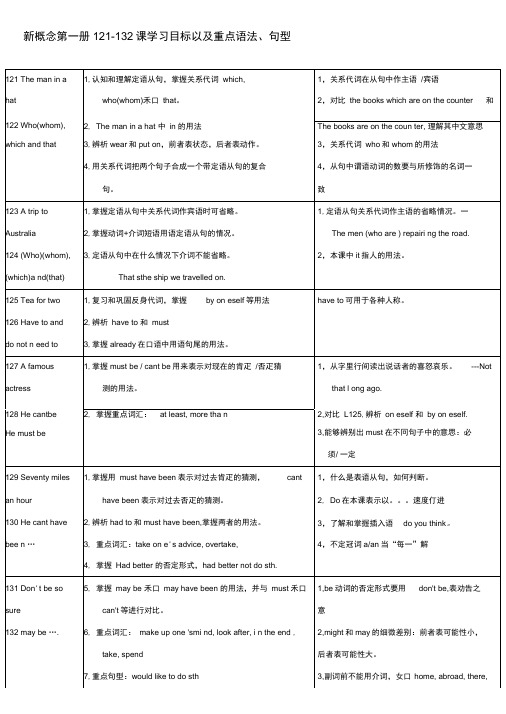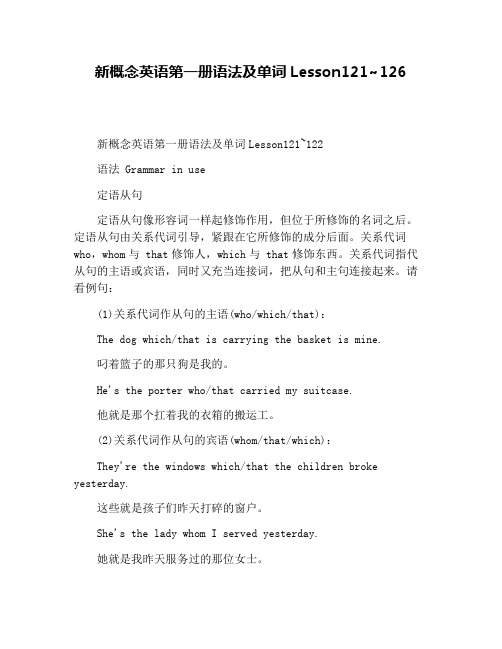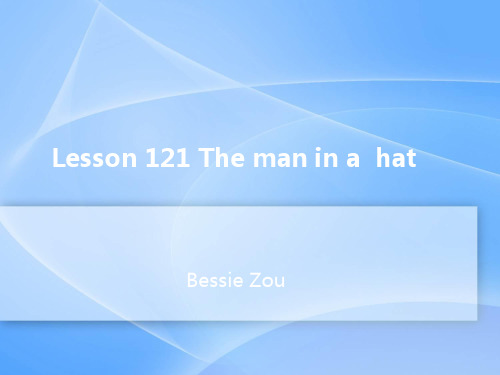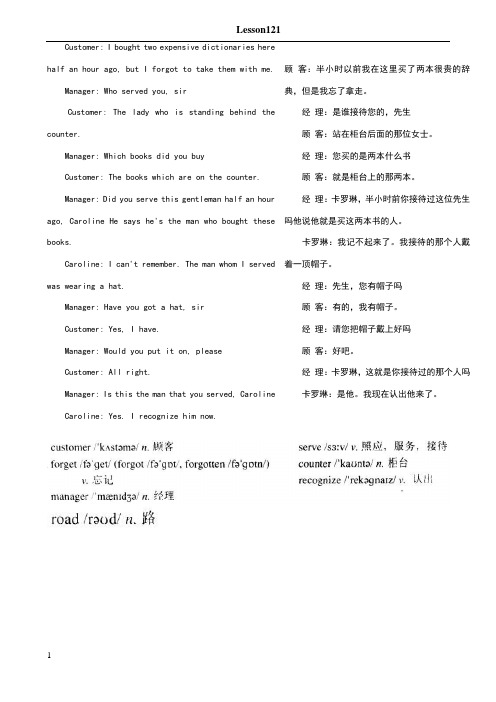新概念英语第一册语法及单词Lesson121~126
新概念英语第一册Lesson123~128自学笔记精讲解析

新概念英语第一册Lesson123~128自学笔记精讲解析新概念英语第一册Lesson123~124自学笔记精讲解析1.What a beautiful ship!多漂亮的轮船啊!what引导的感叹句通常是由 What + a(n)+形容词+名词构成的。
2.That’s right.对。
这句是对上面附加疑问句的回答。
上面一句虽用否定形式提问,但回答则根据事实来决定是用肯定或是否定形式。
That’s right是肯定的回答,相当于Yes, it is(那正是我)。
3.grow a beard,留胡子。
4.shave it off,把胡子刮掉。
it指 a beard。
5.定语成分standing behind the counter和 repairing the road 是现在分词短语,作后置定语,分别修饰 The man, The woman 和The men。
I served yesterday 和I saw yesterday 是定语从句,分别修饰the man, the woman和the men。
此处关系代词 whom 省略了。
I bought yesterday和I found in the garden是定语从句,分别修饰 the book, the books和 the kitten。
关系代词 which或 that 省略了。
新概念英语第一册123-124课语法知识点 Grammar in use定语从句中的省略当关系代词代表主语并且从句中的谓语动词是(现在)进行时态时,关系代词及助动词be均可省略。
如果关系代词在从句中代表宾语,则往往可以省略。
此外,定语从句可用介词结尾。
请分别看以下的例句:The woman standing behind the counter served me.站在柜台后边的那位妇女为我服务/招待了我。
This is the book I bought yesterday.这就是我昨天买的那本书。
新概念第一册重点及重要句型121

新概念第一册121-132课学习目标以及重点语法、句型who ,①(先行词)人+ who/that + 动词(作主语)The man who has white hair is .②(先行词)人 +whose +名词+动词(作定语)I have a friend whose father is a teacher.③(先行词)人 + who/whom/that + 及物动词/不及物动词 +介词(做宾语)The man we met is my uncle.④(先行词)物 + which/that + 动词(作主语) Lesson 121 & 122 The man in a hat 戴帽子的男士重点句型:在作业本上抄写重点句型,并翻译成汉语: 1. Who served you, sir .2. The lady who is standing behind the counter.3. Is this the man that you served, Caroline4.1 recognize him now.5. She is the woman who I served yesterday. 重要语法一一定语从句定语从句像形容词一样起修饰作用 ,但位于所修饰的名词之后。
定语从句由关系代词引导,紧跟在它所修饰的成分后面。
关系代词 whom 与that 修饰人,which 与that 修饰东西。
关系代词指代从句的主语或宾语,同时又充当连接词,把从句和主句连接起来1、关系代词: who, whom, whose, which, thatwhich 是指人以外的生命或没有生命的东西.:This is the bird which always sings at night. ⑤(先行词)物 +which/that + 主语 + 及物动词(作宾语) .:This is the letter I received yesterday.2、定语从句中的省略① 当关系代词代表主语并且从句中的谓语动词是(现在)进行时时态时,关系代词及助动词 be 均可省略② 如果关系代词在从句中作动词或介词的宾语,关系代词往往可以省略。
新概念英语第一册语法及单词Lesson121~126

新概念英语第一册语法及单词Lesson121~126新概念英语第一册语法及单词Lesson121~122语法 Grammar in use定语从句定语从句像形容词一样起修饰作用,但位于所修饰的名词之后。
定语从句由关系代词引导,紧跟在它所修饰的成分后面。
关系代词who,whom与 that修饰人,which与 that修饰东西。
关系代词指代从句的主语或宾语,同时又充当连接词,把从句和主句连接起来。
请看例句:(1)关系代词作从句的主语(who/which/that):The dog which/that is carrying the basket is mine.叼着篮子的那只狗是我的。
He's the porter who/that carried my suitcase.他就是那个扛着我的衣箱的搬运工。
(2)关系代词作从句的宾语(whom/that/which):They're the windows which/that the children broke yesterday.这些就是孩子们昨天打碎的窗户。
She's the lady whom I served yesterday.她就是我昨天服务过的那位女士。
词汇学习 Word study1.recognize v.(1)认出;理解:I recognize him now.我现在认出他来了。
Can you recognize this tune?你能听出这支曲调吗?(2)承认;确认:I recognize that he is more capable than I am.我承认他比我更有水平。
They recognized Richard as his lawful heir.他们确认理查德为他的合法继承人。
Are British medical qualifications recognized in other European countries?英国的医生执照在欧洲其他国家能否得到承认?2.serve v.(1)服务;接待;侍候:Are you being served, sir?先生,有人为您服务吗?A young waiter served them.一位年轻的侍者侍候他们进餐。
新概念英语第一册 lesson 121

peaked capberetbaseball capWoolen capsunhat▪customer n. 顾客▪forget v. 忘记▪manager n.经理▪serve v. 照应,服务▪counter n. 柜台▪recognize v. 认出▪Customer is god.▪cf: customs▪customs officer (L15)▪forget to do 忘记要做…▪forget doing sth 忘记已经做过…▪①I forget to send an email to him. ▪我忘了给他发邮件了。
▪(忘记要发邮件,邮件还没发)▪②I forget sending an email to him.▪我忘记给他发过邮件了。
▪(忘记已经发过了,邮件已经发出了)▪He is a store manager. ▪他是一位商店的经理。
▪总经理▪general manager▪A young waiter served them.▪I bought the watch at the counter. ▪这只表是我在这个柜买的。
▪I recognize him now.▪我现在认出他来了。
▪Can you recognize this music?▪你能听出这支曲子吗?▪Do you_________(认出) him now ?▪I ______ (忘记) to send an email to him ▪A young waiter _______(服务) them yesterday.▪___________(顾客) is god.▪I bought the watch at the ________(柜台).▪He is a store __________(经理).recognize forget served Customer manager counter▪1.When had he bought the two dictionaries?Half an hour earlier.▪2.Where were the books?They were on the counter.▪3.Did Caroline remember the person who had bought the dictionaries?No, she didn't.▪4.How did she recognize him as the man whom she had served?She recognizes him when he put his hat on.▪Customer: I bought two expensive dictionaries here half an hour ago, but I forgot to t ake them with m e.▪Manager: Who served you, sir?▪Customer: The lady who is standing behind the counter.▪Manager: Which books did you buy?▪Customer: The books which are on the counter.take sth with sb 把某物带走I took some medicine with me when I went to the village.我去那个村庄的时候我随身带了一些药。
新概念英语第一册第121-122课分解

❖ After self-reading, read the conversation loudly following CD.
Revision: Lesson121 The man in a hat Text
= I’ll take my friends in Beijing some presents.
Key words&expressions
2. forget [fə‘get] v.忘记(forgot/ forgotten) ❖ forget to do sth 忘记要做某事 ❖ forget doing sth 忘记已经做过某事
大家感受一下这两个句子: ❖ ①I forget to send an email to him. (忘记要发邮件,邮件还没发) ❖ ②I forget sending an email to him.(忘记已经发过了,邮件已经发
❖ manage ['mæ nid3] v. 管理
❖ manage a company 经营公司
Key words&expressions
4.serve [sə:v] v.
❖ (1)服务;接待;侍候: ❖ Are you being served, sir? 先生,有人为您服务吗? ❖ (2)供给;摆出(食物或饮料等):
❖ customer ❖ forget ❖ manager ❖ serve
❖ counter ❖ recognize
n. 顾客 v. 忘记 n. 经理 v. 照应,服务,
接待 n. 柜台 v. 认出
cards game
新概念英语第一册第121课Lesson121课文单词知识点

v1.0 可编辑可修改Lesson121Customer: I bought two expensive dictionaries herehalf an hour ago, but I forgot to take them with me.Manager: Who served you, sirCustomer: The lady who is standing behind the counter.Manager: Which books did you buyCustomer: The books which are on the counter.Manager: Did you serve this gentleman half an hour ago, Caroline He says he's the man who bought these books.Caroline: I can't remember. The man whom I served was wearing a hat.Manager: Have you got a hat, sirCustomer: Yes, I have.Manager: Would you put it on, pleaseCustomer: All right.Manager: Is this the man that you served, Caroline Caroline: Yes. I recognize him now.顾客:半小时以前我在这里买了两本很贵的辞典,但是我忘了拿走。
经理:是谁接待您的,先生顾客:站在柜台后面的那位女士。
经理:您买的是两本什么书顾客:就是柜台上的那两本。
经理:卡罗琳,半小时前你接待过这位先生吗他说他就是买这两本书的人。
卡罗琳:我记不起来了。
我接待的那个人戴着一顶帽子。
经理:先生,您有帽子吗顾客:有的,我有帽子。
新概念第一册Lesson121
Could you… ? Would you like… ?表示提议 ? Would you like a cup of coffee?
11. recognize sb./sth. (by sth.) 通过某物认出某人/某物
I recognized her by her coat which was red. recognize sb./sth. (as sth.)承认某人/某物(为... ) We all recognized him as the monitor.
Have you got a hat, sir? Yes, I have. Would you put it on, please? All right. Is this the man that you served, Caroline? Yes. I recognize him now. 10. Would you … ?委婉表达请求
窗户很大的那间房子是个教室。 The room whose windows are big is a classroom. 我在找我上周买的那本书。 I am looking for the book that I bought last week. 我昨天给那个住在楼上的医生打了个电话。 I called the doctor who lives upstairs yesterday. 我想买他们昨天卖的那辆车。 I want to buy the carwhich they sold yesterday . 我想买一个可以分期付款的电视机。 I want to buy a TVwhich I can buy on installments 那个头发很长的女的是我们老师。 The woman whose hair is long is our teacher.
新概念英语一精品讲义教师版L121~122教师版
Lesson 121 ~ 122 The man in a hat◆词汇详解(1) customer n. 顾客营业员和顾客shop assistant and customerregular customer 经常光顾的客人/常客(2) forget v. 忘记forgot-forgotten结构:forget to do sth. 忘记要去做某事forget doing sth. 忘记做过某事e.g. I have forgotten to bring my book.(bring)I will never forget finding that rare coin in my garden.(find)(3) manager n. 经理a shop manager 商店经理(4) serve v. 服务,接待为…服务serve sb. 为顾客服务serve the customers(5) counter n. 柜台on the clothing counter 在服装柜台(6) recognize v. 认出我现在认出他的声音来了。
I recognize his voice now.(7) road n. 路福州路Fuzhou Road谚语:All roads lead to Rome. 条条道路通罗马; 殊途同归(1) …but I forgot to take them with me.●take sth. with sb. 随身带着某物e.g. It’s going to rain. Take the umbrella with you. 要下雨了,带好伞。
(2) Would you put it on, please?●Would you … please? 表示提出客气的请求,相同表达方式还包括:Could you … please?e.g. Would you open the window? 你能开一下窗吗?●put on 穿上,文中的it指代衣服辨析:wear穿着(强调结果)V.S. put on穿上(强调动作)反义词组:take sth. off 脱下✍试一试:选词填空1. I like to wear the hat every day.2. Please put on your shoes. It is so untidy here.定语从句I●课文原句重现:The lady who is standing behind the counter.The books which are on the counter.He says he’s the man who bought these books.The man who I served was wearing a hat.Is this the man that you served, Caroline?●什么叫定语?相当于语文中的“的”,用来修饰名词。
新概念英语第一册:125-126课 语法及单词解析
新概念英语第一册:125-126课语法及单词解析【篇一】语法 Grammar in usemust, have to和 needn't这3个词都表示必要性。
在前面已对 must和 have to介绍过。
must是情态助动词,而have to是普通动词,二者在肯定句中一般可以互换,表示不可逃避的义务或责任。
must更带有说话人的主观色彩,而have to则更强调客观要求和外界影响。
must一般只能表达现在的必要性,而have to则可以表达过去或将来的必要性。
对比例句:Must you go now?你必须现在就走吗?Yes,I have to leave at once.是的,我不得不马上就走。
Yes,1 must leave at once.是的,我必须马上就走。
I shall have to leave London tomorrow.我明早得离开伦敦。
I had to stop smoking because it was forbidden in my company.因为我所在的公司内禁止抽烟,所以我不得不停止了吸烟。
如果我们用 must来提问,则只能用needn't来表达否定的回答。
needn't 还可以理解为have to的否定回答。
needn't (don't need to)和 don't have to都表示不必要;而 mustn't却表示绝对禁止,在说话人看来根本没有选择余地。
请看例句:Must she leave early?她必须早走吗?She needn’t leave early.她不必早走。
Do you have to take a taxi?你必须乘出租汽车吗?I don’t have to/need to take a taxi.我不必乘出租车。
You mustn't turn left.你不能左转弯。
2020最新新概念英语第一册语法及单词Lesson121~126
新概念英语第一册语法及单词Lesson121~122语法 Grammar in use定语从句定语从句像形容词一样起修饰作用,但位于所修饰的名词之后。
定语从句由关系代词引导,紧跟在它所修饰的成分后面。
关系代词 who,whom与 that修饰人,which与 that修饰东西。
关系代词指代从句的主语或宾语,同时又充当连接词,把从句和主句连接起来。
请看例句:(1)关系代词作从句的主语(who/which/that):The dog which/that is carrying the basket is mine.叼着篮子的那只狗是我的。
He's the porter who/that carried my suitcase.他就是那个扛着我的衣箱的搬运工。
(2)关系代词作从句的宾语(whom/that/which):They're the windows which/that the children broke yesterday.这些就是孩子们昨天打碎的窗户。
She's the lady whom I served yesterday.她就是我昨天服务过的那位女士。
词汇学习 Word study1.recognize v.(1)认出;认识:I recognize him now.我现在认出他来了。
Can you recognize this tune?你能听出这支曲调吗?(2)承认;确认:I recognize that he is more capable than I am.我承认他比我更有能力。
They recognized Richard as his lawful heir.他们确认理查德为他的合法继承人。
Are British medical qualifications recognized in other European countries?英国的医生执照在欧洲其他国家能否得到承认?2.serve v.(1)服务;接待;侍候:Are you being served, sir?先生,有人为您服务吗?A young waiter served them.一位年轻的侍者侍候他们进餐。
- 1、下载文档前请自行甄别文档内容的完整性,平台不提供额外的编辑、内容补充、找答案等附加服务。
- 2、"仅部分预览"的文档,不可在线预览部分如存在完整性等问题,可反馈申请退款(可完整预览的文档不适用该条件!)。
- 3、如文档侵犯您的权益,请联系客服反馈,我们会尽快为您处理(人工客服工作时间:9:00-18:30)。
新概念英语第一册语法及单词Lesson121~126新概念英语第一册语法及单词Lesson121~122语法 Grammar in use定语从句定语从句像形容词一样起修饰作用,但位于所修饰的名词之后。
定语从句由关系代词引导,紧跟在它所修饰的成分后面。
关系代词 who,whom与 that修饰人,which与 that 修饰东西。
关系代词指代从句的主语或宾语,同时又充当连接词,把从句和主句连接起来。
请看例句:(1)关系代词作从句的主语(who/which/that):The dog which/that is carrying the basket is mine.叼着篮子的那只狗是我的。
He’s the porter who/that carried my suitcase.他就是那个扛着我的衣箱的搬运工。
(2)关系代词作从句的宾语(whom/that/which):They’re the windows which/that the children broke yesterday.这些就是孩子们昨天打碎的窗户。
She’s the lady whom I served yesterday.她就是我昨天服务过的那位女士。
词汇学习 Word study1.recognize v.(1)认出;认识:I recognize him now.我现在认出他来了。
Can you recognize this tune?你能听出这支曲调吗?(2)承认;确认:I recognize that he is more capable than I am.我承认他比我更有能力。
They recognized Richard as his lawful heir.他们确认理查德为他的合法继承人。
Are British medical qualifications recognized in other European countries?英国的医生执照在欧洲其他国家能否得到承认?2.serve v.(1)服务;接待;侍候:Are you being served, sir?先生,有人为您服务吗?A young waiter served them.一位年轻的侍者侍候他们进餐。
(2)供应;摆出(食物或饮料等):What time is breakfast served in this hotel?这个饭店里什么时候供应早餐?Serve it to the ladies first.把它先端给女士们。
(3)为……服务/服役;任职:The old cook has served the family for 30 years.这位老厨师已为这家干了30年了。
He began to serve in the Navy in 1960.他从1960年起开始在海军服役。
新概念英语第一册语法及单词Lesson123~124语法 Grammar in use定语从句中的省略当关系代词代表主语并且从句中的谓语动词是(现在)进行时态时,关系代词及助动词be均可省略。
如果关系代词在从句中代表宾语,则往往可以省略。
此外,定语从句可用介词结尾。
请分别看以下的例句:The woman standing behind the counter served me.站在柜台后边的那位妇女为我服务/招待了我。
This is the book I bought yesterday.这就是我昨天买的那本书。
The man I served was wearing a hat.我招待过的那个人当时戴着一顶帽子。
That’s the ship we travelled on.那就是我们旅行时乘的船。
That’s the man I told you about.那就是我告诉过你有关情况的那个人。
词汇学习 Word study1.travel v.(1)旅行;游历:He said that if he had a lot of money he would travel around the world.他说,如果他有很多钱的话,他将会周游全世界。
(2)行进;(被)传送:Light travels faster than sound at the speed of 300,000 kilometres per second.光速比声速要快,为每秒钟30万公里。
The news didn’t travel as fast as we had expected.这消息传播得不如我们所预料得那样快。
2.offer v.(1)(主动)给予;提供:He is offered a job in Canada.有人提供给他一份在加拿大的工作。
We offered some coffee to the guests.我们为客人们提供了咖啡。
(2)提出;出(价):Do you have any good suggestions to offer?你能否提供一些好的建议?I’ll offer you £ 30,000 for the house.这所房子我愿出3万英镑买下来。
(3)(主动)表示愿意,提议:He offered to help me with my research paper.他表示愿意帮助我一起做我的研究论文。
‘I could lend you some books,’Jane offered.“我可以借你一些书,”简自告奋勇地提议。
3.grow v.(1)生长;成长:His hair has grown too long.他的头发长得太长了。
The trees have grown rapidly.树木生长得快。
(2)使生长;留(须发):He grew a beard during the trip.他在旅行时留了胡子。
We grew a lot of roses in our garden.我们在自己的花园里种植了大量的玫瑰花。
新概念英语第一册语法及单词Lesson125~126语法 Grammar in usemust, have to和 needn’t这3个词都表示必要性。
在前面已对 must和 have to介绍过。
must是情态助动词,而have to是普通动词,二者在肯定句中一般可以互换,表示不可逃避的义务或责任。
must更带有说话人的主观色彩,而have to则更强调客观要求和外界影响。
must一般只能表达现在的必要性,而have to则可以表达过去或将来的必要性。
对比例句:Must you go now?你必须现在就走吗?Yes,I have to leave at once.是的,我不得不马上就走。
Yes,1 must leave at once.是的,我必须马上就走。
I shall have to leave London tomorrow.我明早得离开伦敦。
I had to stop smoking because it was forbidden in my company.因为我所在的公司内禁止抽烟,所以我不得不停止了吸烟。
如果我们用 must来提问,则只能用needn’t来表达否定的回答。
needn’t 还可以理解为have to的否定回答。
needn’t (don’t need to)和 don’t have to都表示不必要;而 mustn’t却表示绝对禁止,在说话人看来根本没有选择余地。
请看例句:Must she leave early?她必须早走吗?She needn’t leave early.她不必早走。
Do you have to take a taxi?你必须乘出租汽车吗?I don’t have to/need to take a taxi.我不必乘出租车。
You mustn’t turn left.你不能左转弯。
(表示绝对禁止)词汇学习 Word study1.mean v.(1)意味着,即:It’s raining! That means you don’t need to water the garden.下雨了!这就是说,你不必给花园浇水了。
(2)(词语)表示……意思:What does‘perfume’ mean in English?“perfume”一词在英语中是什么意思?The green light means‘Go on.’绿灯的意思是“继续向前”。
(3)意指;意欲:What I mean is that we’ll have to go back and look for it.我的意思是:我们必须回去寻找它。
He didn’t mean to hurt you.他的本意并不是想伤害你。
2.water v.(1)浇(洒)水;供水;喂水:The garden is very dry, I’m going to water it tomorrow morning.花园里很干了,明早我准备给它浇些水。
Tim is watering his lovely little dog.蒂姆正在给他那只可爱的小狗喂水。
(2)充满水;充满泪水;流口水:He felt sad and his eyes watered a little.他感到难过,眼睛有点儿湿润了。
Ice cream always makes his mouth water.冰淇淋总能让他馋得淌口水。
(3)搀水冲淡;加水稀释:Someone had been watering the milk.有人往牛奶里搀了水。
He always waters drinks and sells them to tourists.他总是在饮料里搀水并将之卖给游客们。
